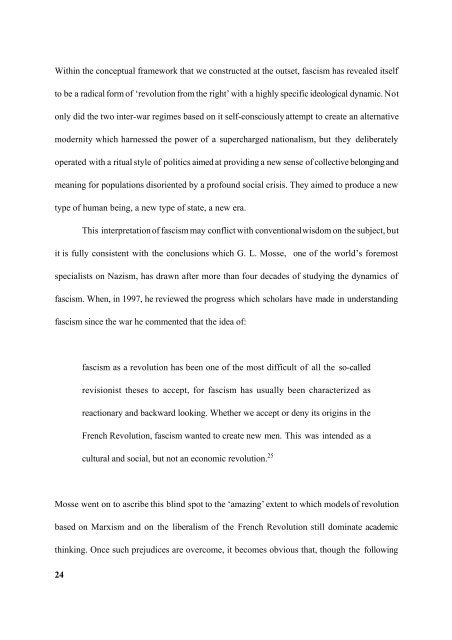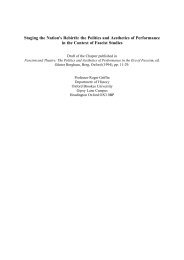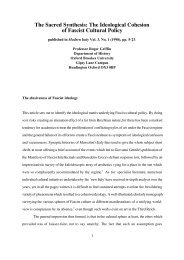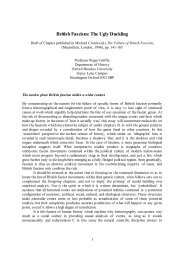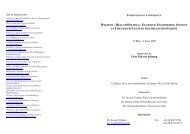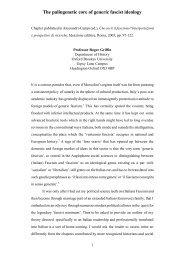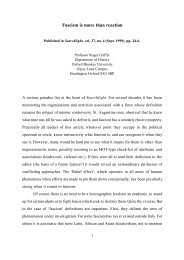Revolution from the Right: Fascism - School of Arts and Humanities ...
Revolution from the Right: Fascism - School of Arts and Humanities ...
Revolution from the Right: Fascism - School of Arts and Humanities ...
Create successful ePaper yourself
Turn your PDF publications into a flip-book with our unique Google optimized e-Paper software.
Within <strong>the</strong> conceptual framework that we constructed at <strong>the</strong> outset, fascism has revealed itself<br />
to be a radical form <strong>of</strong> ‘revolution <strong>from</strong> <strong>the</strong> right’ with a highly specific ideological dynamic. Not<br />
only did <strong>the</strong> two inter-war regimes based on it self-consciously attempt to create an alternative<br />
modernity which harnessed <strong>the</strong> power <strong>of</strong> a supercharged nationalism, but <strong>the</strong>y deliberately<br />
operated with a ritual style <strong>of</strong> politics aimed at providing a new sense <strong>of</strong> collective belonging <strong>and</strong><br />
meaning for populations disoriented by a pr<strong>of</strong>ound social crisis. They aimed to produce a new<br />
type <strong>of</strong> human being, a new type <strong>of</strong> state, a new era.<br />
24<br />
This interpretation <strong>of</strong> fascism may conflict with conventional wisdom on <strong>the</strong> subject, but<br />
it is fully consistent with <strong>the</strong> conclusions which G. L. Mosse, one <strong>of</strong> <strong>the</strong> world’s foremost<br />
specialists on Nazism, has drawn after more than four decades <strong>of</strong> studying <strong>the</strong> dynamics <strong>of</strong><br />
fascism. When, in 1997, he reviewed <strong>the</strong> progress which scholars have made in underst<strong>and</strong>ing<br />
fascism since <strong>the</strong> war he commented that <strong>the</strong> idea <strong>of</strong>:<br />
fascism as a revolution has been one <strong>of</strong> <strong>the</strong> most difficult <strong>of</strong> all <strong>the</strong> so-called<br />
revisionist <strong>the</strong>ses to accept, for fascism has usually been characterized as<br />
reactionary <strong>and</strong> backward looking. Whe<strong>the</strong>r we accept or deny its origins in <strong>the</strong><br />
French <strong>Revolution</strong>, fascism wanted to create new men. This was intended as a<br />
cultural <strong>and</strong> social, but not an economic revolution. 25<br />
Mosse went on to ascribe this blind spot to <strong>the</strong> ‘amazing’ extent to which models <strong>of</strong> revolution<br />
based on Marxism <strong>and</strong> on <strong>the</strong> liberalism <strong>of</strong> <strong>the</strong> French <strong>Revolution</strong> still dominate academic<br />
thinking. Once such prejudices are overcome, it becomes obvious that, though <strong>the</strong> following


